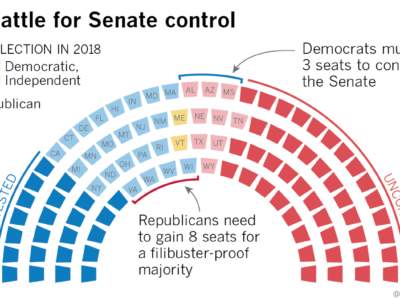US Senate
The filibuster and climate change legislation
Should we eliminate the Senate filibuster to advance climate change legislation
As the Democratic Presidential primary season has unfolded, a number of the candidates have argued for eliminating the filibuster in the Senate completely. (It is currently gone for confirmation of nominations of judges and executive branch officials, but remains for substantive legislation.) So has former Democratic Senate Majority Leader Harry Reid. One of the key …
Continue reading “The filibuster and climate change legislation”
CONTINUE READINGSenate Update
Will environmentalists have any leverage in the Senate? Here are the races to watch.
Where are we in the battle to control the Senate? I’ve posted previously about eight key races. Here are the current predictions from two leading forecasters. In every case where both candidates for these Senate seats have LCV scores, the Democrat’s score is at least 40% better than the Republican’s, and often the disparity is …
Continue reading “Senate Update”
CONTINUE READINGCruz, Fischer and Mourdock: Three Tea Party Senate Candidates Versus the Environment.
Tea Party candidates defeated less extreme conservatives in three GOP Senate nominating contests. Their environmental views are ultra-Right Wing. These candidates should be right on your wavelength — if you think that there’s a plan for U.N. world domination, that EPA should be gutted or abolished, and that climate change is a deliberate hoax by …
CONTINUE READINGIs this any way to run a democracy?
It isn’t exactly news that the U.S. Senate is an anti-majoritarian institution. The filibuster, which effectively allows 41 Senators to block action, gets a lot of attention. But much worse is the “hold,” which lets a single senator stand in the way of a bill or nomination. According to the Senate’s glossary, a hold is …
Continue reading “Is this any way to run a democracy?”
CONTINUE READINGForecasting climate votes in the Senate
Nate Silver, the statistician who gained prominence in the last election cycle with his predictions for the presidential race, has modeled the prospects of the Waxman-Markey climate bill in the Senate. The analysis is necessarily based on a number of assumptions, such as that the bill doesn’t change in its progress to the Senate floor. …
Continue reading “Forecasting climate votes in the Senate”
CONTINUE READING




